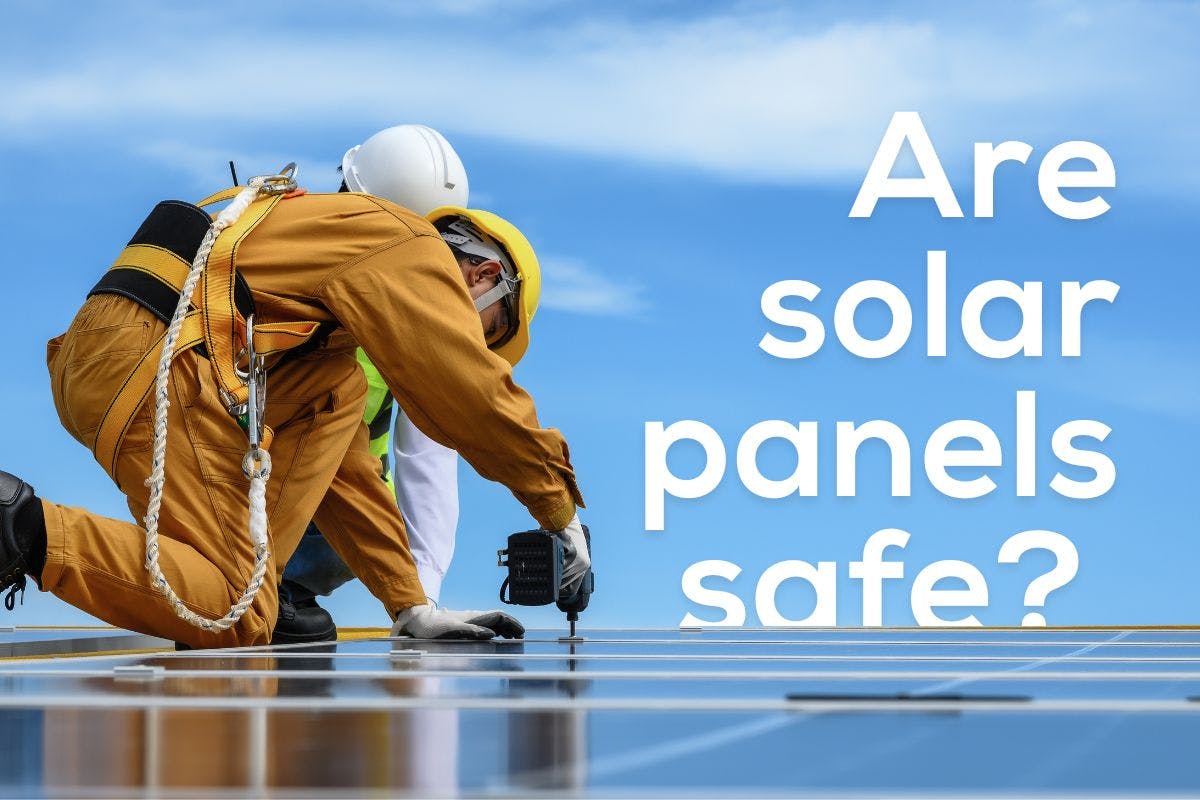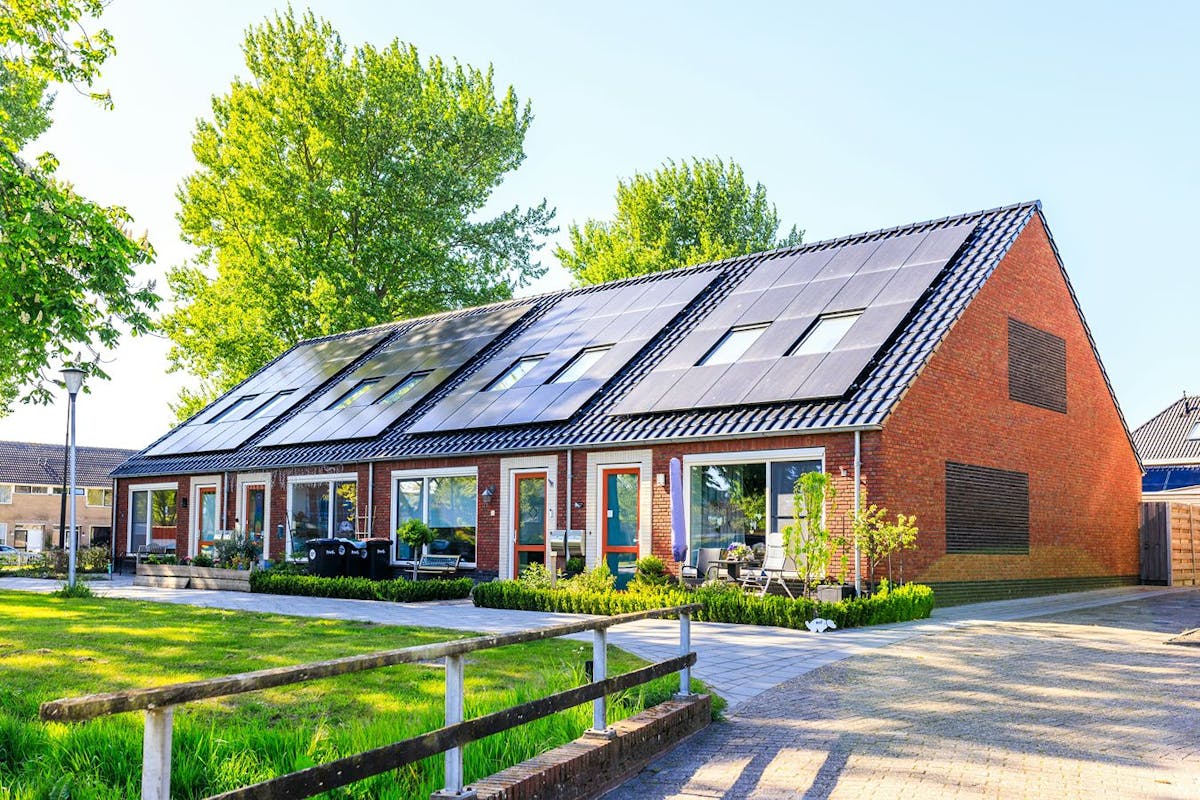Is It Safe to Have Solar Panels on Your Roof?
Last edited

Author
Andrew Giermak
Solar and Electrification Writer and Editor

Editor
Andrew Blok
Electrification and Solar Writer and Editor

Home solar panels are becoming more and more mainstream. Nearly five million homes have solar panels in the US, and the number keeps growing.
Still, some myths persist, including the idea that they’re unsafe, either for your roof or the people who live under it.
If you’re thinking about joining the millions of people who have adopted clean, safe solar electricity at home, here’s what you need to know.
See how much you can save by going solar with Palmetto
Solar Power’s Health and Environmental Benefits
Before we get too deep into debunking common solar safety misconceptions, let’s first focus on solar panels' positive health effects. Solar energy has many health and environmental benefits compared to other electricity sources like coal and natural gas.
The Department of Energy highlights the following human health benefits of solar energy adoption.
Improved air quality
When fossil fuels burn, they emit particulate matter (PM), which pollutes the air in communities near power plants. This can even be true of the air quality inside homes with some gas-powered appliances.
Replacing fossil fuels with clean energy like solar, air quality in the United States can improve significantly, lowering the risk of respiratory issues like asthma and bronchitis.
Water conservation
Although utility-scale solar power systems (solar farms) use a modest amount of water, solar power production requires significantly less water than most other electricity resources. Residential solar panels use no water once installed. Especially in areas prone to droughts, water conservation is intrinsically linked to human health and longevity, and solar presents a significant opportunity to cut back.
Reduced greenhouse gas emissions
Climate change comes with a host of human health and safety consequences. Replacing fossil fuel-fired electricity production with solar electricity can reduce greenhouse gas emissions and help slow climate change.
Solar Panel Misconceptions
Although solar technology has been in research, development, and use since the 19th century, the recent acceleration of solar power system adoption has led many people to question the health effects of solar panels. Below, we’ll deal with some of the more common misconceptions.
Do solar panels cause cancer?
In short, no. Solar panels do not cause cancer. No scientific evidence links the two.
In one the most extensive examinations on the subject, a study from the National Institute of Health found no associations between solar energy and mortality for brain/nervous system cancer, breast cancer, cancer of the cervix uteri, colon/rectum cancer, gallbladder cancer kidney/renal pelvis cancer, cancer of the larynx, melanoma of the skin, myeloma, oral cavity and pharynx, cancer of the pancreas, prostate cancer, stomach cancer, or thyroid cancers.
See how much you can save by going solar with Palmetto
Is there a risk of radiation from solar panels?
While generating electricity, solar panels emit a low-level electromagnetic field (EMF), which is technically a form of radiation. And while the term “radiation” can be alarming, solar panel EMFs are considered non-ionizing, safe, and not all that different from those produced by power lines, hair dryers, microwaves, TVs, radios, and WiFi routers.
Looking at over 30 years of research, the World Health Organization (WHO) concluded “current evidence does not confirm the existence of any health consequences from exposure to low-level electromagnetic fields.”
Knowing this, the low-level, harmless EMF radiation from solar energy systems should not prevent you from going solar.
Do solar panels create heat on your roof?
Another misconception is solar panels create more ambient heat because they absorb sunlight and are often hot on the panel surface.
Research from the University of California-San Diego in 2023 shows a roof with solar panels has its daylight temperature drop by an average of 5 degrees Fahrenheit because panels absorb the heat rather than the roof itself, and less heat is transferred through the roof into the home.
Are solar panels toxic?
The vast majority of minerals in solar panels and batteries are non-toxic, except for a few heavy metals. However, these elements (like cadmium and silver) are not present in every type of solar panel. When they are, the toxic materials are safely contained within the panels and do not present a safety risk throughout decades of electricity generation.
Instead, the toxic materials found in some solar panels only potentially pose health and safety concerns when mishandled during the manufacturing or decommissioning process. While most solar panel materials can be recycled, the careful and thoughtful development and disposal of toxic solar panel materials is critical to their overall environmental impact.
Read more: How Green Are Solar Panels?
Do solar panels create waste at the end of their lifespan?
As more solar power systems near the end of their life, what happens to the panels and material?
Solar panels are recyclable, and recycling technology is steadily improving and expanding. The average solar panel lasts 25 or more years, and this tech is getting better, too. Recycling the materials used in panels makes disposal safer and is the best environmental answer.
Is Solar Safe?
In summary, solar panel systems are safe to have on your roof, both structurally and, more importantly, for your and your family's health. By going solar, you can help place a small piece of the puzzle currently being constructed to create a more sustainable world powered by clean energy.
Solar power is a much better alternative to fossil fuels for human and environmental health.
No inherent health risks are associated with installing solar panels on your home.
Having a professional install your solar panels minimizes possible safety risks.
If you are interested in a free consultation for solar panels on your home, contact us today, design your custom system, or explore all of our solar energy resources for homeowners.
See what solar can do for you:
Frequently Asked Questions
Will solar panels damage my roof?
Not if installed correctly by an experienced company. Reputable companies should inspect your roof virtually or in person before installing solar and provide warranties against leaks caused by their panels. Solar panels aren’t too heavy for structurally-sound roofs and a new system should be specifically designed for your roof.
Do solar panels contain toxic materials?
Solar panels are manufactured with some minerals and elements which could be unsafe. However, these substances are safely contained in the panels and there’s virtually no risk with normal use.
Do solar panels emit radiation?
Solar panels emit a low-level electromagnetic field which is a form of radiation. But, electromagnetic fields are safe and appliances or devices like routers, radios, and microwaves emit these same low-level fields.


